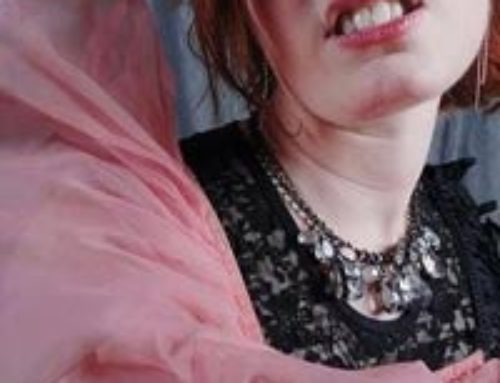Evelyn & Amelia at the Charity School
September
That first night we all stood around in the courtyard,
trying to remember how we’d gotten there.
We all held identical brown suitcases.
The youngest were crying, and some of the older girls
took courage in comforting them, letting them
wipe tears against their shoulders. It was cold—
the moon already high over the stone wall
and the cabbage roses. We were hungry.
Had we eaten on the train? I couldn’t remember the train,
or the station, or the day leading up to this night—
though I remembered the long anticipation of travel,
the anxiety of holding a ticket I mustn’t lose.
Finally a tall lady appeared at the door of the house
(had we even noticed there was a house?),
and said, what are you doing out there in the dark?
We were ushered in and given bread softened in milk
at a long table, then led to a chamber lined
with beds against the walls. We all drew identical
white nightgowns from our suitcases and pulled them
over our heads. We were led in prayer, asking to be chaste
and good and clean, and then the candle was extinguished.
October
Our studies by this time well underway, I found that I was less suited than most for scholarship. Latin remained a mystery, and hard as I prayed to be a tidy child I was constantly scolded for the ink on my hands, my messy braid, and the state of my socks. Taking the air in the courtyard, it seemed I couldn’t walk five steps without getting something resinous or with bloody juice on my person. Running on the flagstones I was always falling. Still, arithmetic remained the worst of my persecutions: I was told I had no head for numbers.
My comfort at this time was Amelia, a girl my age who had no compunctions about copying out her sums for me. Also she had hair the color of caramel. She would come to my bed after the candle was blown out and we would whisper stories about the unrecorded miracles of Mary, the Greek deities, and the denizens of cupcake shops. In truth, we were so poorly fed that many of our stories featured rich foods. In class we exchanged notes so cunningly encoded that we didn’t understand them even as we wrote them. To my missive, if apricot jam, then the gray mare cross the river, I received the reply, the heart is fit precisely in its wedge. This correspondence was kept between the pages of our hymnals.
It was in October that some of the girls noticed the foxes standing outside the dormitory windows at sunrise. Their discovery led to a new level of seriousness in our academic lives, as though their presence each morning, their watchfulness, instilled a certain gravity in our studies.
November
With November’s rains
came long hours indoors, exploring
the many chambers and haunted attics
of the old house. We found
a trunk of antique wedding dresses,
so small they could have been sewn
for the foxes. We found a trunk of spoons,
one of which had a card tied to it
identifying it as the jelly spoon
of the dead queen. We found
a crate of books in Arabic and a crate
of pornographic nursery rhymes.
One of the girls found a skunk-fur coat,
and we staged elaborate ceremonies
with her as Pope. We found
a novel in manuscript entitled The Clothesline Diaries
under a loose floorboard in the dormitory,
penned by one Eugenie Haworth.
Rumor had it Eugenie was a former student
of our venerable institution, and the novel
made the rounds, being read by moonlight
to the exclusion of sleep and studies.
We had a sense of its illicit nature,
since it concerned a fictional teacher of French
and her exploits with strange men in the shrubbery.
Meanwhile, my Latin was coming along—
though on more than one occasion
I was made to stand in the corner
in punishment for my poor penmanship.
December
There were days of rehearsing for the Christmas pageant, whose program kept changing. At one point we were all to dress as forest creatures, panicked by the sound of distant, howling wolves. Then it was decided we should be angels, gathered round the manger, and we spent entire afternoons sewing our own wings—which, by the time they were finished, were sweat-stained and blood-spotted. When the night of the pageant actually arrived, we were herded onstage in our uniforms and given the music to “Good King Wenceslas,” which we hadn’t practiced. The audience was an indistinguishable gray landscape, from whence the sound of shuffling programs and scraping boot-heels occasionally issued. The song went on and on, this version apparently having endless additional verses, and by midnight we were singing about the invention of buttons and antibiotics, and their benefits to impoverished children everywhere. The smallest girls were falling asleep, one by one, collapsing on the stage and being left to lie there, and then the older girls were succumbing, too, until finally it was just me, singing about ocean liners and cigarettes and gramophones to the tune of the ancient carol. Still, I must have drifted off, because the next thing I knew I was waking with a sore throat in my bed in the dormitory.
I was one of many who stayed for the holiday vacation, having nowhere else to go, and we all nearly froze to death because the furnace was turned down to save fuel. Late one night I opened the window and said to the ever-present foxes, what are you doing out there in the dark? They skulked in, one by one. They were shy at first, but by morning they’d each curled under the covers of a girl’s bed, a pointed face tucked under each girl’s chin, and I do believe their warmth kept us alive during that bitter season.
January
Amelia did not return
after the holiday break.
We all had our theories
on where she was, but the nuns
were silent on the subject.
With them it was as though
a girl named Amelia
had never existed at the school.
At night, in the dormitory,
we all whispered stories,
many shamelessly borrowed
from The Clothesline Diaries,
about her adventures. We believed
that she had been discovered
to be of royal blood, and that even now
she was ruling her own small
but exciting country, and preparing
for her wedding with some foreign prince.
My sums suffered badly without her help.
I continued to write her cryptic notes,
stored between pages in my hymnal,
which were even more impenetrable
now that they constituted only half
the conversation: The fish
are all in silk in the fountain.
The deftness of needles astonishes me.
February
At last some signs of spring
seemed to be appearing,
and the collective depression
of the girls lifted a little. A sequel
to The Diaries, entitled The Teacup Diaries,
was found under a drawer’s false bottom,
and was passed around and read
with as much breathless excitement
as the first installment. Birds
were returning to the pear trees
and willows that ringed the courtyard,
and the foxes were by now so tame
that we were able to attire them
in the wedding dresses at last,
and we’d even managed to teach them
a couple of words: “mother” and “scone.”
It was strange to see their foxy mouths
forming the words, but their voices
were wild and lilting and sweet.
Dear Amelia, I wrote, finally
settling on clarity as the best approach,
Where are you? We miss you terribly.
Soon the crocuses will appear
and we’ll be able to play outside
without getting frostbite. When I think of you
I remember long, starlit nights
under the covers, whispering the lyrics
of songs, and the time Sister Margaret
slapped your hand and called you pagan
for tossing a penny in the well.
I threw one in yesterday, when no one
was looking, and wished I’d see you soon.
Love, Evelyn. Not knowing where
to send it, or how much postage
was required, I sealed the letter
and stuck it with the others in my hymnal.
March
We were taken, for our amusement and edification, to a large gallery in the city. The Roman gods looked down on us from the great height of their stone plinths, and we dared one another to stroke their calves when the nuns weren’t looking. A number of girls disappeared into paintings, never to emerge. Helen rolled up her skirt waist in the washroom and seduced a docent—we last saw them embracing behind a late Doric column, his hand at the small of her back, her eyes closed….
All in all, we were a much smaller group on the return trip, and many of the remaining girls were weeping. I heard one of the sisters say, Well, at least we won’t have the expense of feeding so many.
Dear Amelia,
Today when we lined up for porridge I accidentally slopped some on the heel of the girl in front of me, and she pushed me so hard against the table I got a bruise on my hip shaped exactly like a crucifix. Everyone is asking to see it! I wish you were here—a new litter of fox kits has just been born. Some of the older foxes are dressing in uniform now, taking the place of the girls we lost at the museum. They go to lessons and everything, and the sisters don’t even notice.
All my love,
Evelyn
April
At last a reply from Amelia appeared in my hymnal! Dear Evelyn, she wrote, Thank you for your letters. I’ve missed you, too; last night I dreamed we were living in a tall tree, and we wore golden crowns, and every kind of fruit you can imagine grew on the branches. I’m afraid I’ve gotten horribly behind in Latin—I have no opportunity to practice here. And I haven’t brushed my hair in days. I miss brushing yours—it’s so sleek it won’t stay in a braid. I will visit you over the summer holidays. Everything will be just the way it was before. Until then, Amelia.
Meanwhile, we were all studying for our examinations. If we didn’t do well, we’d have to repeat this year’s lessons. By some miracle I managed to squeak by, even in arithmetic. Those who excelled were given gold pins to wear on their blazers for a day and an extra helping of porridge.
A couple of girls came down with spring colds, and Doctor Richard was called to the school. We all fell a little bit in love with him, I’m afraid, with his soft brown horse and his gentle hands. Before long there was a spring cold epidemic, and future installments of The Diaries would feature Doctor Richard saving the lives of countless fragile maidens.
May
At a brief ceremony of farewell,
the sisters assured us they’d see us all
when we returned in September.
That night, the foxes proclaimed their rage
at being thus deserted, announcing
that when we got back they’d be quite wild again,
and that we shouldn’t even bother
to use human speech, as they intended
to forget every word of it. We tried
to put them in their favorite dresses
to make amends, but they shredded
the delicate fabric with their claws
and ran back out into the darkness.
Later, at a secret rite of disclosure
during which girls admitted
to stealing bonbons or short-sheeting,
Eugenie Haworth’s identity was revealed—
not an alumna at all, but one
of our own number, a quiet,
unexceptional girl who was rarely noticed.
In the morning we packed
our brown suitcases and were taken
to the station, where we held our tickets
in sweating hands and boarded the train for home—
wherever that was. As the sound of the rails
and the rocking of the car put me to sleep,
I hoped that Amelia would be there,
waiting to sing while she brushed my hair,
and that it was near the sea—a wooden house
overlooking a bay, maybe—
very quiet at night except for the sound
of the grass talking in the wind,
softly going over its impossible sums.
* * * * * * * * *
 Karin Gottshall lives in Middlebury, Vermont, and is a reader for New England Review. Her poems have recently appeared in The Virginia Quarterly Review and the Harvard Review, and on the website Failbetter.com. Her first book, Crocus, won the Poets Out Loud Prize and was published by Fordham University Press in 2007. She’s taught writing at Interlochen Arts Academy and at Middlebury College.
Karin Gottshall lives in Middlebury, Vermont, and is a reader for New England Review. Her poems have recently appeared in The Virginia Quarterly Review and the Harvard Review, and on the website Failbetter.com. Her first book, Crocus, won the Poets Out Loud Prize and was published by Fordham University Press in 2007. She’s taught writing at Interlochen Arts Academy and at Middlebury College.




